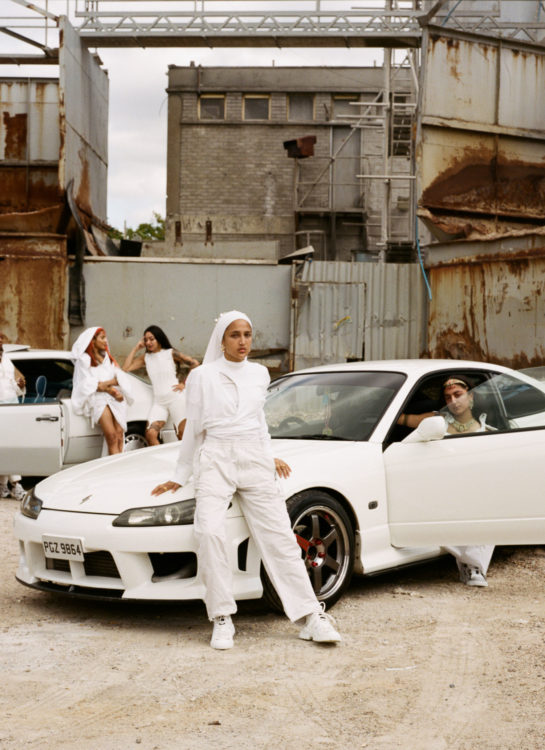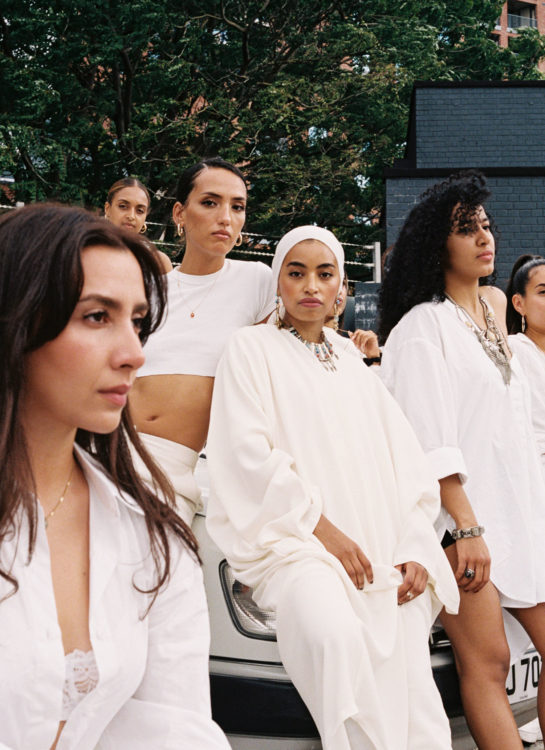- Words Notion Staff
AZEEMA is run by the community, for the community.
Based in London, AZEEMA is a cross-platform magazine, creative agency and collective that prioritises the visibility of women and non-binary folk within West Asia, North Africa, South Asia, diasporas and beyond.
Since its launch in 2017, AZEEMA has grown into a positive cultural force that celebrates heritage, culture and identity. Through their publication, creative agency and music hub, AZEEMA FM, the team have collaborated with the likes of the British Fashion Council, Nike, Calvin Klein, the V&A museum, Tate and the Barbican.


Can you introduce yourselves and what you each do at AZEEMA?
Jameela: I’m the Editor in Chief, Founder + Creative Director of AZEEMA. I’m also a freelance photographer, creative director and DJ. I lead and manage the overall vision and direction of AZEEMA — from curating and designing our social media to developing creative concepts for shoots and overseeing our print magazine, curating AZEEMA FM, sometimes photographing for us, and most importantly making executive decisions across all aspects of the company and its different branches.
Sunayah: I’m the Deputy Editor, Brand Manager + Producer of AZEEMA, as well as a freelance writer, creative producer and DJ. I oversee the production of all shoots and events at AZEEMA —my favourite part! I work closely with our clients and community to manage projects and build relationships at AZEEMA Agency, and look after the social media too. I’m usually involved with all aspects of the business, whether it’s creating the print issues, programming events, writing or making important decisions with Jameela and Evar.
Evar: I’m the Senior Editor, Senior Brand Consultant + Creative of AZEEMA. I’m also a multi-disciplinary artist, archivist and founder of The West Asian and North African Women’s Art Library (The WANAWAL). I work closely with Jameela and Sunayah across all dimensions of the business. I write, edit and commission pieces for print and our digital platform. I also often facilitate our community events centred on art, history, culture and politics. At the agency, I help with the creative and production side of things for shoots, and dabble in art direction.
Dalia: I’m Digital Editor + Production Assistant at AZEEMA. I oversee the website’s editorial content by commissioning and writing stories. I also worked on our recent print issue. As Production Assistant, I help the team coordinate shoots and communicate with clients. One of my favourite parts of the job is running workshops for our community, like our recent Barbican event, helping to organise events like our Tate Late, and sitting on panels representing the team. I’m also a freelance writer, editor and producer.
In the wider team we also have Ella Lucia, Naailah Khalifa, Nour Khairi, Zaynab Lunat, Fatima Benjelloun, Larena Amin, Shayma Bakht and Yassmine Benalla who help out across events, editorial and agency projects. We’re lucky to have such an incredible team that we can call our family!


What was the inspiration behind the platform?
The inspiration behind the magazine came from a real need to be understood and seen. (Jameela is Sudanese/English —and this blend comes with many intersections which are not often understood). The name AZEEMA (chosen by Jameela’s Baba!) means ‘strength, firmness of purpose and determination’ in Arabic, which is the ethos of everything that we do. Essentially the magazine was born out of frustration at the lack of representation of people like us in Western media — brown and Black women or non-binary folk. We often channel that frustration into making meaningful, empowering content or creating inclusive spaces that celebrate our community and cultures. We centre women and non-binary folk in every form, through our images, stories and sounds.
How have you evolved since your launch in 2017?
AZEEMA launched as a university project and has grown in more ways than we could have ever imagined. We now have four beautiful (and big) print issues under our belt, a digital platform filled with thought-provoking, considered content, a creative agency that promotes visibility and cultural amplification, AZEEMA FM where we celebrate and highlight the diaspora through sound, and last but not least the most incredible community that supports and believes in us.
AZEEMA was never started with the intention of becoming a big business, so that in itself has been a big evolution and learning curve.
What role does representation play within the work that you do? Why is this important?
J: It’s so important, especially to outwardly create and present an anti-narrative that is actually representative of people that exist with many nuances. Representation is everything. I felt very alone and isolated in my feelings before AZEEMA, now there is a whole community and family of people who relate.
S: In companies, in the media and in day-to-day life individuals from our community are tokenised and misrepresented a lot of the time, especially from a Western gaze. There’s a lot of misconception as the understanding and education just isn’t there. AZEEMA aims to explore all the cultural intersections that exist within our community, educating others as we go.
D: It’s important to note that we do so much more than simply represent our communities. Because we are run by a team of women and non-binary folk, we have created an economy where a diverse community of creatives work both in front of and behind the camera. We don’t just have women and non-binary folk of colour on our covers, but we have them writing our stories, producing our shoots, styling, planning… the whole process!

What kind of space are you hoping to provide for your community?
E: A space where each individual is safe to exist as they are. We strive to bring different people, narratives, voices and experiences together to show how multifaceted identities can be and that exist within the WANASA regions, diaspora communities and beyond.
D: A space which facilitates co-learning and communication. We aim for all our spaces — whether they be parties, workshops or events — to encourage conversation around the issues that affect us as women and non-binary people of colour.
What’s one of your proudest moments as a collective?
E: Our issue 4 launch. We worked insanely hard to create an incredible book that really captures the complexities, intricacies and narratives of our community. Having it in my hands and seeing everyone celebrate it was really beautiful.
S: To echo Evar, releasing issue 4 was a really special moment and to this day feels like such an achievement. We really poured our hearts and souls into every single page, which we hope other people can see.
Our events have also been really special, such as our takeover of the Raphael Gallery at the V&A Museum. We held an ‘Anti-Art School’ V&A late which touched on decolonising the curriculum while exploring the power and potential of art schools. It was open to the public and seeing people from all backgrounds, of all ages engage with our work was a beautiful experience.
What are some of the challenges of running AZEEMA?
S: Aside from the obvious financial challenges that come with running an independent, grassroots publication and platform, we’ve experienced challenges as a whole and individually. Five years ago, we wouldn’t have believed you if you’d told us that we’d be running a business with a team of 12 working on a global scale. We don’t have business backgrounds and haven’t had the experience, insight or access to a lot of tools that would have made the journey easier. Running a business is really difficult, especially when you have to work other jobs just to financially sustain yourself.
As we often cover sensitive and deeply personal subjects, another challenge is making sure we’re always considerate of that and are representing others in the most authentic way we can. We’ve worked so hard to get AZEEMA to where it is today, and we’re extremely proud of that but we still have a long way to go.

How are you impacting culture for the future?
E: We constantly work and provide opportunities to those from our own communities, showing that creating our own spaces and building our own businesses and platforms are just as impactful and powerful. We are also plastering our existence EVERYWHERE. You can’t not see us or hear us anymore, and if that’s the case, it’s by choice.
What legacy do you hope to leave?
J: One that is long lasting, and highly regarded. Something that is cherished and loved not just by us but the people that it represents. In many ways we are pioneers of something, and that is really special. It’s brave and different and I’ll always be proud of us.

